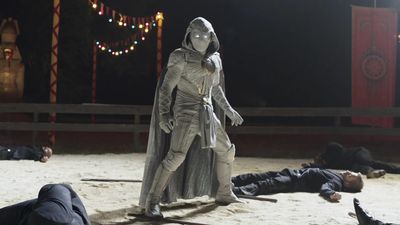How Marvel's 'Moon Knight' Handled Egyptian Representation
Disney+'s 'Moon Knight' joins another Marvel project, 'Black Panther,' on the exploration of African identity and themes. So how did the show do?
Disney+'s Moon Knight dimmed out its light this week. The season finale, which premiered today, left viewers asking if there will be another season. Moon Knight is a lesser-known caped superhero from Marvel Comics, so no one could predict what a small-screen adaptation would look like. So when the series Moon Knight was introduced for the first time, excitement around a new MCU project was usual, but this one had no reference for success.
Marvel Studios’ Moon Knight | Official Trailer | Disney+
The result is trippy sequences and tomb-raiding action with Marvel touches. Further, the show traffics in a great deal of Egyptian deities and mythology. Oscar Isaac plays the titular role Marc Spencer, the avatar of the Egyptian moon god Khonshu. Khonshu grants Spencer superhuman abilities as Moon Knight to carry out his holy vengeance. Egyptian references are present throughout the show. Even the looming stature of Khonshu, with a hovering bird skull, is wrapped like a mummy.
As the first season wraps, the question remains: how well did it handle Egyptian representation? While the show has its flaws — some viewers have complained about the pacing, others have poked fun at Isaac’s British accent — Egypt seems to be excellently represented.
Marvel has explored mythology before, but this is the first time it folded Egyptian history into its cinematic universe. Because of its Arabic character, Egypt, like many Middle Eastern countries, are subjected to orientalist tropes in Hollywood films. This means that depictions are made to be intentionally exotic, exaggerated, or distorted, all done to reinforce western perceptions of such regions. (Not forgetting the yellow filter in these depictions, a visual framing that suggests these places are ‘’backward’’ or “filthy’’ or ‘’uncivilized.’’)
This was the pitfall Moon Knight’s lead director and executive producer Mohamed Diab was trying to avoid. Diab’s proposal to the studio was to let him portray Egypt without orientalist trappings. He toldThe Hollywood Reporter last month, “A big part of our pitch was avoiding the orientalist look, which dehumanizes us. It shows as exotic, where women are submissive and men are evil. And it wasn’t only about representation of the people, but of the place itself.”
Interestingly, Moon Knight wasn’t filmed in Egypt. Much of the show’s scenery and action take place elsewhere, like Hungary, Slovenia, and Jordan. The first time Egypt is shown, it’s towards the end of the second episode, "Summon the Suit." Spencer opens the windows from a high building, revealing pyramids in a far distance and a cluster of houses with native architecture. Jordan was a stand-in location for Egypt, and it’s a testament to Diab’s creative imagination and production team.
Egypt was made to look and feel real, and not some orientalist La La Land. Social media is usually a great barometer for viewers’ reaction to pop culture events. So when Egyptian rap song "El-Melouk" — from Ahmed Saad, 3enba and Double Zuksh — played in the end-credits of the second episode, the reception was overwhelmingly positive. Many viewers, especially those of Egyptian or Arab identity, couldn’t hide their excitement, expressing how they felt seen.
Upbeat and lively, its feature on Moon Knight winked at Egypt’s burgeoning rap scene and dance music. Dubai-based Egyptian DJ Kaboo felt the same elation too. His song Enta, from his 2020 project Arab Trap, was featured at the end of the show’s third episode.
At the core of the show is Egyptian mythology, where viewers are introduced to a pantheon of gods and symbolisms, from the aforementioned Khonshu to others, including Ammit, Tefnut, Horus, Isis, Osiris, Hathor, and Taweret. Episode five, "Asylum," plumbed the depths of the spirit realm, using metaphorical placeholders and imagery.
For Diab, who incidentally is Marvel’s first Egyptian filmmaker, representation on screen was as important as representation off screen. The hiring of composer Hisham Nazih, editor Ahmed Hafez and other Egyptian creatives like Reem al-Adl and Ali Hossam came from a desire to achieve authenticity. Egyptian actors such as Amr Al-Qadi, Zizi Dagher, Ahmed Dash and Hazem Ehab appeared in various scenes in Moon Knight. Antonia Salib voiced Taweret, the Egyptian goddess of fertility shown as a CGI hippo. (A British actress but of Egyptian descent, this was Salib’s major debut role.)
While Moon Knight is a personality clash between Marc Spencer and Steven Grant (another alter ego), it makes allowance for Layla, another note-worthy character played by Egyptian-Palestinian actress May Calamawys. Layla is complex and interesting, can defend herself in crisis, steering away from orientalist framings of Arab women.
Moon Knight joins another Marvel project on the exploration of African identity and themes. Like Diab, Ryan Coogler wanted African representation in Black Panther, exploring mythos and cultures. Although both works vary greatly in scale and ambition, they align in depicting genuine African storytelling.
- 5 African Superheroes You Need To Know - OkayAfrica ›
- Africa's First Marvel Superhero Makes His Cinematic Debut In ... ›
- Marvel's First Nigerian Superhero, Penned by Nnedi Okorafor, Is ... ›
- Breaking Down the First Trailer of “Black Panther: Wakanda Forever” - OkayAfrica ›
- Travis Scott's 'Utopia' Show at Pyramids of Giza Canceled Over Cultural Concerns - Okayplayer ›
